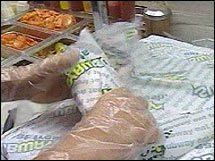|
The Subway saga Restaurant operators square off against the parent company of the world's largest sandwich chain in a growing dispute over control of its advertising budget. NEW YORK (CNNMoney.com) -- Everybody knows that Jared lost 245 pounds on the Subway diet, but few people know about the battle brewing over the sandwich chain's advertising funds. Earlier this month, a group representing more than 14,500 Subway restaurant operators sued the parent company as part of a growing dispute over control of its advertising budget.
The North American Association of Subway Franchisees (NAASF) in Coral Gables, Florida, accused Doctor's Associates Inc. (DAI), the franchiser of the privately held sandwich chain, of pushing a new franchise agreement giving Subway complete control of money that franchise operators paid into an advertising trust fund. The issue stems from a new franchise agreement first introduced by founder Fred DeLuca in April that allows DAI to redirect franchisee advertising dollars away from the Subway Franchisee Advertising Fund Trust (SFAFT), which is governed by a board of elected franchisees, to a separate entity created by DAI. Subway franchisees pay 4.5 percent of their weekly sales to the fund, which is valued at approximately $400 million. "We respect our franchiser and its founder, Fred DeLuca, for what they have built," Kevin Brough, chairman of NAASF, said in a statement. "The new franchise agreement introduced by DAI on April 1, 2006, however, threatens to erode the foundations of the Subway system, by destroying franchisees' trust in the good intentions of our franchiser." Subway receives an 8 percent royalty off of each franchisee's top-line sales, whether the franchisee is making a profit or not, Jim Hansen, CEO of NAASF, explained. Franchisees fear that, under the new structure, the ad dollars will be put toward campaigns that drive up sales, such as two-for-one sandwich specials, at the expense of profits. It is important for franchisees to be able to control their advertising budget and protect their profitability, Hansen said. "DAI having control over the decision-making of the trust could seriously alter the types of marketing programs that are offered." Against the grain Moreover, Subway's new franchise agreement comes at a time when franchisers have been trending toward giving franchisees more discretion over advertising funds. "This is a simple issue of DeLuca saying 'It's my company and I should be able to call the shots,'" said Bob Purvin, CEO of American Association of Franchisees and Dealers, a franchisee advocacy group. "It really comes down to who gets what authority over these funds." "A concern on Subway's side is that NAASF has become a very powerful. But it is a concern to me when Subway begins to take authority away from the franchisees," Purvin said. To avoid such problems, Purvin recommends that would-be franchise buyers look for companies that have excellent relationships with its franchisees. In addition, prospective buyers should look for companies that have a strong franchisee organization with negotiating leverage, he said. A franchiser who does not permit its franchisees to organize is a sure sign of trouble ahead, he said. An earlier suit The Subway lawsuit comes on the heels of another suit filed in June against DAI by SFAFT on behalf of over 10,000 franchisees. That suit also seeks to block DAI from attempting to control the national advertising program. "Both (lawsuits) want to have the independent SFAFT organizations reestablished," said Hansen. Although the dispute is now in the hands of the courts, "we remain hopeful that we can reach an amicable resolution," a spokesman for DAI said. Headquartered in Milford, Conn., Subway was co-founded by Fred DeLuca and Dr. Peter Buck in 1965. At that time, Buck was a scientist with a doctoral degree, and DeLuca had aspirations of becoming a medical doctor. Hence the name Doctor's Associates. The world's largest sandwich chain currently operates 26,183 restaurants in 85 countries. |
|

